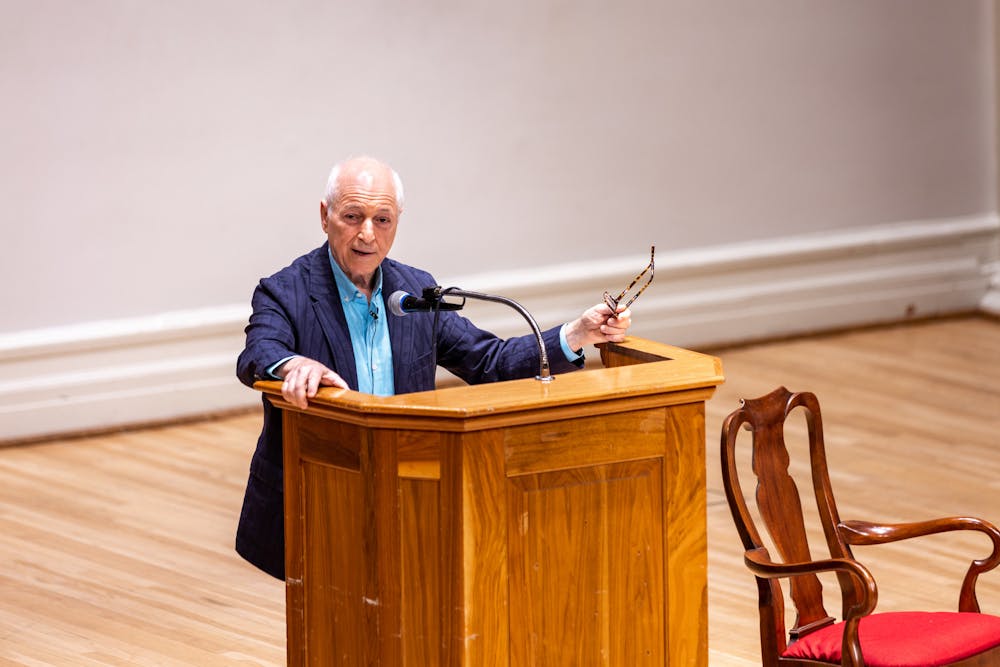Author André Aciman spoke about his identity as a Sephardic Jew and the unique challenges of Jewish identity around the world at the keynote opening presentation for the Inaugural Conference on Jewish Life in the Diaspora Sunday. The event was organized by the Jewish Studies Program, an interdisciplinary program in the College of Arts and Sciences that offers both a major and a minor, as well as graduate degrees.
The theme of his address, titled “Sephardic Jews and the Question of Multiple Identities,” was the complex nature of identities for Jewish people, drawing from his own complex background and difficult attachment to Judaism. The Inaugural Conference on Jewish Life in the Diaspora, organized by the University’s Jewish Studies program, is centered this year around the Sephardic Jewish diaspora, aiming to highlight the stories of Sephardic figures to help reimagine important themes in modern Judaism.
Sephardic Jews are a Jewish diaspora group primarily tracing their roots to the Iberian Peninsula, though the term is often used to refer to historical Jewish communities surrounding the Mediterranean and throughout the Middle East who share similar customs.
In the late 15th century, both the Spanish and Portuguese monarchs expelled Jews from their countries, creating large migrations and a scattered diasporic community.
André Aciman is a bestselling author, best known for his 2007 novel “Call Me by Your Name”, a story following the romance between a 17-year-old and 24-year-old, which was adapted into an Oscar-nominated film in 2017. Aciman has written extensively about his Sephardic Jewish identity, most notably in his critically acclaimed 1995 memoir, “Out of Egypt.” In a 2000 work titled “Reflections of an Uncertain Jew,” Aciman wrote of his conflict with his Jewish identity.
“I am a Jew who loves Judaism provided it’s on the opposite shore, provided others practice it and leave me to pursue my romance of assimilation,” Aciman wrote. “I am a Jew who longs to be in a world where everyone is Jewish, where I can finally let down my guard; but I am a Jew who has spent so much time defining himself in relation to non-Jews that I wouldn’t know how to live … in a world where everyone was Jewish.”
While Aciman was born in Alexandria, Egypt, he never became an Egyptian citizen and his family left the country in 1965, nine years after the mass expulsion of many Jews during the Suez canal crisis. Though his family traced their heritage to Italy and Turkey, Aciman felt no attachment to those countries, even associating himself with France, due to his family speaking French at home, despite having no family there.
Aciman described himself as being a “Jew of discretion,” a term he created that appeared in “Call Me by Your Name.” The label refers to Jews who are comfortable in being Jewish, but out of prudence choose to mask their identity to avoid risk of discrimination or violence.
Aciman discussed how this is a phenomenon he’s noticed in Jews around the world, and that openness about Judaism is a fairly new concept in the western world, as there is a long history of Jewish people hiding their religion for social or safety reasons.
“No Jew is not hidden,” Aciman said, noting that the history of Jewish diaspora includes a lot of masking of identity.
He said that many Jewish people have two conflicting identities, a “true” one and a “mask,” which leads to them having incomplete attachments to both. He said that though he is Jewish and pretended to be Christian, he “belongs to neither camp.”
Aciman discussed how even prior to expulsion many Jews already hid their religion, and proposed that the forced decision of expulsion, conversion or death that many Sephardic Jews faced contributed to the history of masking religion out of prudence.
One possible origin for the word “Hebrew” comes from an old word translating to “outsider” or “someone from across,” Aciman said. The history of Jewish diaspora is being from elsewhere, never feeling comfortable to be openly Jewish and never feeling entirely part of their gentile environment.
Barring a brief expression of sadness regarding the ongoing conflict in Gaza that has already led to the deaths of around 1,400 Israelis and over 10,000 Palestinians in the introductory remarks, the presentation was overall devoid of discussion of the unrest in Israel. Sephardic Jews notably make up over 50 percent of Israel’s Jewish population, and many settled there after their expulsions from other Middle Eastern countries.
In a 2009 editorial for the New York Times, Aciman criticized President Barack Obama’s failure to mention the history of Sephardic expulsions during his June 2009 speech in Egypt where he called for a “new beginning” for American relations with the Islamic world.
Alongside the Aciman presentation, the conference comprised two panel sessions on Monday about Sephardic Women’s Lives and the Art of Biography, as well as a Sephardic Culinary Workshop on Thursday.






